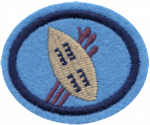Difference between revisions of "AY Honors/African Lore/Answer Key/es"
(Created page with "{{clear}}") |
(Created page with "{{clear}}") |
||
| Line 295: | Line 295: | ||
{{clear}} | {{clear}} | ||
| − | + | {{clear}} | |
| − | + | {{clear}} | |
|Shamans = ''Inyanga'' (literally "the man of the trees") is a Zulu word for a traditional healer. | |Shamans = ''Inyanga'' (literally "the man of the trees") is a Zulu word for a traditional healer. | ||
Revision as of 22:28, 1 December 2014
| Folclore Africano | ||
|---|---|---|
| Asociación General
|
Destreza: 1 Año de introducción: 2001 |
|
Requisitos
1. Ser capaz de nombrar y localizar al menos 10 diferentes tribus africanas de la actualidad y decir varias características de cada una.
2. Hacer lo siguiente:
a. Seleccionar una tribu africana para el estudio. Si usted pertenece a una tribu africana, seleccionar una que no sea la suya.
b. Encontrar información detallada sobre las tribus seleccionadas, en las siguientes áreas:
i. Los hábitos alimenticios
ii. Ceremonia de iniciación
iii. Médicos tradicionales y yerbateros
iv. Condiciones de vida y cultos
v. Educación��
=vi. Entierros
vii. Dinero
iix. Vestido
ix. Industria
|Shamans = Inyanga (literally "the man of the trees") is a Zulu word for a traditional healer.
Although the word sangoma is generally used in South African English to mean all types of traditional Southern African healers, inyangas and sangomas are in fact different. An inyanga is an herbalist who is concerned with medicines made from plants and animals, while a sangoma relies primarily on divination for healing purposes. The knowledge of the inyanga is passed through the generations from parent to child.
In modern society the status of these medicine men or women has been translated into wealth. Most izinyanga (plural of inyanga) in urban areas have shops with consulting rooms where they sell their medicines.
|Living conditions = The modern Zulu population is fairly evenly distributed in both urban and rural areas. Although KwaZulu-Natal is still their heartland, large numbers have been attracted to the relative economic prosperity of Gauteng province.
|Religion=Most Zulu people state their beliefs to be Christian. Some of the most common churches to which they belong are African Initiated Churches, especially the Zion Christian Church and various Apostolic Churches, although membership of major European Churches, such as the Dutch Reformed, Anglican and Catholic Churches is also common. Nevertheless, many Zulus retain their traditional pre-Christian belief system of ancestor worship in parallel with their Christianity.
3. Contar un cuento popular africano junto con su moraleja.
4. Hacer una colección de al menos 15 objetos fabricados por tribus africanas (que no sean hechos por usted mismo).
Referencias
- Categoría: Tiene imagen de insignia
- Adventist Youth Honors Answer Book/Honors/es
- Adventist Youth Honors Answer Book/es
- Adventist Youth Honors Answer Book/Skill Level 1/es
- Categoría: Libro de respuestas de especialidades JA/Especialidades introducidas en 2001
- Adventist Youth Honors Answer Book/General Conference/es
- Adventist Youth Honors Answer Book/Unknown/es
- Adventist Youth Honors Answer Book/Unknown/Primary/es
- Adventist Youth Honors Answer Book/Stage 100/es
- Adventist Youth Honors Answer Book/Completed Honors

